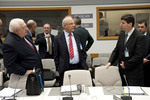News
| Date | Title | |
| 29 Nov. 2017 |  |
NATO trains Egyptian experts in improvised explosive devices investigation Fifteen experts from the Egyptian Armed Forces took part in a training from 13 to 23 November 2017 at the Counter-Improvised Explosive Device (C-IED) Centre of Excellence (CoE) in Madrid, Spain. Participants enhanced their skills in collecting, assessing and disseminating information and intelligence on improvised explosive devices that kill both soldiers and civilians. |
| 29 Nov. 2017 |  |
NATO trains Egyptian experts in improvised explosive devices investigation Fifteen experts from the Egyptian Armed Forces took part in a training from 13 to 23 November 2017 at the Counter-Improvised Explosive Device (C-IED) Centre of Excellence (CoE) in Madrid, Spain. Participants enhanced their skills in collecting, assessing and disseminating information and intelligence on improvised explosive devices that kill both soldiers and civilians. |
| 20 Jul. 2017 |  | NATO and the Jordanian Armed Forces inaugurated the newly established Computer Emergency Response Team (CERT) in Amman on 19 July 2017. The CERT was set up as part of a NATO Science for Peace and Security (SPS) project to enhance Jordanian cyber defence capabilities. |
| 20 Jul. 2017 |  | NATO and the Jordanian Armed Forces inaugurated the newly established Computer Emergency Response Team (CERT) in Amman on 19 July 2017. The CERT was set up as part of a NATO Science for Peace and Security (SPS) project to enhance Jordanian cyber defence capabilities. |
| 09 May. 2017 |  |
Iraq further developing its capabilities in the fight against terrorism, with NATO support Today (9 May 2017) marks another important step in the consolidation of NATO’s support to Iraqi security institutions in strengthening their capabilities in the fight against terrorism. NATO trainers and advisors and Iraqi high ranking officers have concluded a three day-workshop designed to enhance Iraqi leadership and training skills in the domains of countering improvised explosive devices, explosive ordnance disposal, and demining. |
| 05 Nov. 2010 |  | National Armaments Directors from NATO member countries met for their biannual Conference (CNAD) on 28 October at NATO Headquarters in Brussels. The event focused on CNAD’s contribution to the broad and ambitious reform package currently under way, which aims to make the Alliance better suited to tackle 21st century challenges. |
| 09 Mar. 2011 |  | Meeting in Brussels from 2 to 4 March, NATO Nations identified a number of specific areas where groups of nations could pool acquisition, training and research efforts, in order to counter the continuing threat posed by improvised explosive devices (IEDs), the biggest killer of NATO troops. |
| 17 Dec. 2012 |  | On 11 and 12 December 2012, the Counter Improvised Explosive Devices Centre of Excellence (C-IED COE) in Hoyo de Mazanares, Spain hosted a conference of the NATO-Russia Council (NRC). The conference focused on the threat posed by improvised explosive devices (IEDs), which is not limited to theatres of operations and affects each of the countries of the NRC. |
| 14 Apr. 2011 |  |
National Armaments Directors focus on Smart Defence and capability needs On 7 April, the Conference of National Armaments Directors(CNAD) brought together top national officials responsible for defence procurement in NATO and partner countries at its biannual conference at NATO Headquarters in Brussels, Belgium. |
| 10 Apr. 2012 |  |
Improvised Explosive Devices, the war of the invisible bombs More than half the casualties among the NATO forces in Afghanistan in 2011 were caused by improvised explosive devices (IED)¹. This is also the case for one in three Afghans killed last year². In 2010, NATO adopted an action plan on counter-IED(C-IED) aimed at increasing the detection and neutralization of such devices, as well as the dismantling of the networks that manufacture them. The NATO C3 Agency (NC3A) is responsible for developing those advanced technologies to combat IEDs. |
